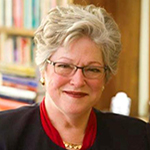 By Molly T. Marshall
By Molly T. Marshall
One of the first Hebrew words I learned in seminary was bara, the word used of God’s creative activity as recounted in Genesis. My Hebrew teacher carefully instructed the nascent scholars that this word could only be used with God as the subject. God creates out of nothing; humans rearrange already existing things. Only God can bara.
This past Sunday I visited the Museum of Modern Art in New York City, and I marveled at the creativity of the artists, especially the works of Monet, Matisse, Picasso and van Gogh. Lingering in front of his “Starry Night,” I was stunned once again by his genius. He painted this while in an asylum after he had cut off his ear. Though his sanity was in question, his creativity was not. It is one of the most widely recognized pieces in the world. Its color and vibrant imagery evoke the sensation of being engulfed by the shimmering stars.
I moved from the floor that houses the paintings to the floor that contains the evolution of the production of music. The science of recording and mass replication of records, tapes and discs revealed how innovation stokes further imagination. Musicians and sound engineers kept finding ways to clarify the authentic beauty of the artistry. Of course, being of a certain age, I did not mind all the pictures of the Beatles on display!
Creativity arises out of being formed in God’s image, which is the true dignity of humans. And while we humans do not call existence into being as our maker does, we have received the remarkable gift of creativity. We view a blank screen, an unbroken plot of ground, a skein of yarn, a piece of wood, and we imagine what might emerge. An essay, a garden, a sweater and a carving demonstrate the capacity to express our unique identity, which displays our kinship to the Creator.
A recent spate of books addresses the centrality of creativity for human flourishing. They tell us of the required patience, necessary sacrifice of other interests, and the daily rituals that create a framework for inspiration. In describing the exacting schedule of English composer Benjamin Britten, Mason Currey, in his thoughtful book Daily Rituals, observes that rather than waiting for inspiration to strike, Britten simply scheduled his work rigorously so that he could create space for creativity to arise through his faithful adherence to the process of working at it.
Of van Gogh’s work habits, Currey writes: “When in the grip of creative inspiration, he painted nonstop, as the artist put it, ‘in a dumb fury of work’.” He was compelled to unleash his prodigious talent, and he relished the relentlessness of discipline. His art kept him relating to others, especially his brother Theo.
Other books on creativity fall into the self-help genre. They speak of the ways we can clear the pathway to inspiration, which is often by exercise, reading great literary works, and better sleep habits. These allow one to get into the “flow” of inspired work.
What these books do not mention is the role of the Spirit of God in human creativity. The indwelling of God’s spirit in every human — yes, those who are not Christian, too — is what grants each a portion of God’s own creative power. Without the presence of God’s Spirit in humans, we would cease to be. Our lives draw their vivification through participating in God’s breathing of life into the world.
Creative inspiration occurs because God blows intimately through our lives, prompting us to seek beauty, which is akin to seeking God. The desire for the holy, an inexorable birthright given to humans, tugs at our hearts all the while. This inspiring presence draws our spirits into the Spirit of God who is ever making all things news — and making new things.
Many of the great composers or visual artists speak of being drawn beyond themselves in the process of producing their great works. They have a sense that they are instruments of a larger creative force that enhances their capacities to convey reflections of the glory of God. Given uncommon energy and focus, they produce enduring masterpieces.
Handel wrote his magisterial Messiah in a scant 24 days, and at the end penned Soli Deo Gloria (to God alone be the glory). Although regarded by some as a mercenary artist, Handel regarded this work as something summoned by God. Sacred and secular persons have received his oratorio as an illuminative gift.
As the church occupies a different cultural space in our time, God is summoning the charism of creativity in leaders and congregations. We cannot afford to plan worship carelessly, without attention to beauty and arresting artistry. Nor can we ignore the varied media through which God speaks. The Spirit of God is nudging us toward creative expressions of faith and practice and, hopefully, we will more fully embody God’s own creativity.
